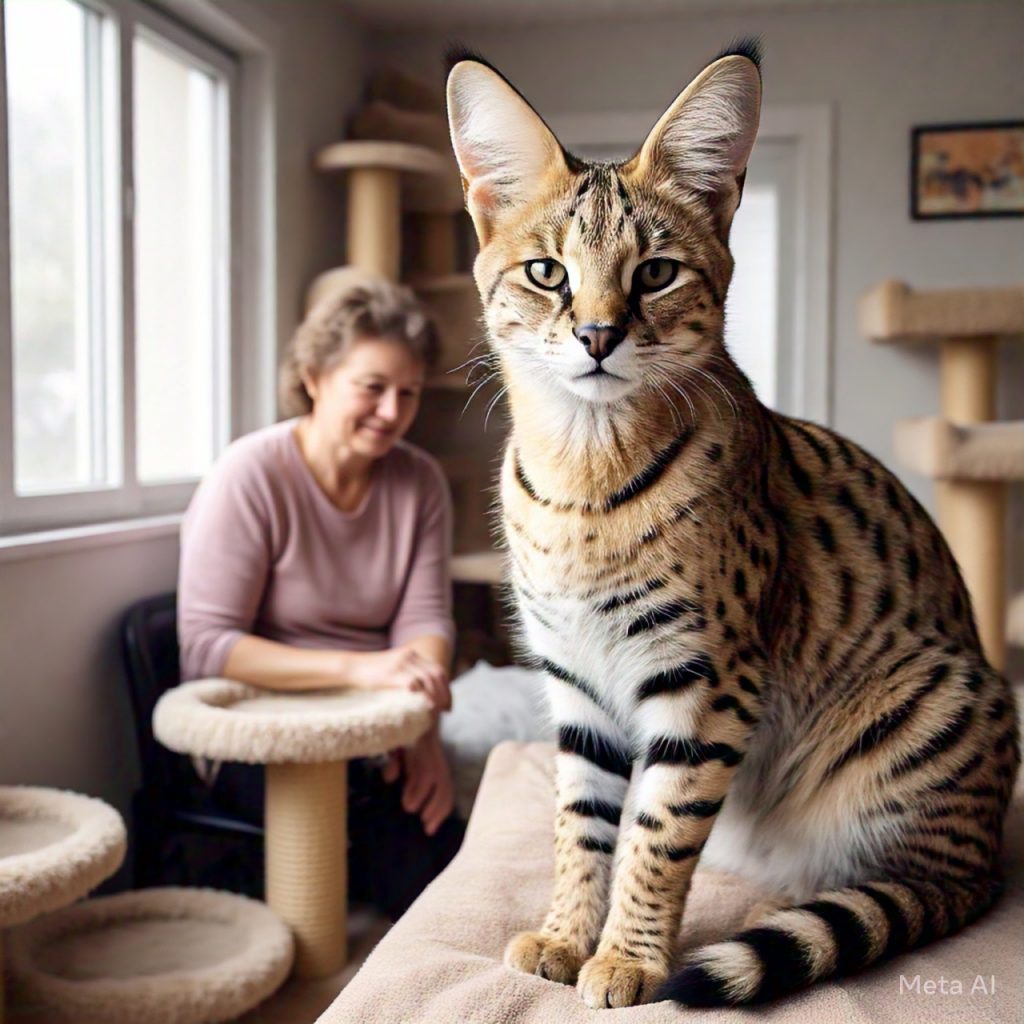Understanding Servals: The Basics
Before starting a serval breeding business, it’s essential to familiarize yourself with their biology, behavior, and needs.
Physical Traits
- Size: Servals are medium-sized cats weighing 20-40 pounds and standing up to 24 inches tall at the shoulder.
- Coat: Their golden-yellow fur with black spots and stripes is a defining characteristic.
- Lifespan: In captivity, servals can live 20+ years with proper care.
Behavior and Temperament
- Servals are highly active, curious, and territorial. They are skilled hunters with exceptional jumping and climbing abilities.
- They bond with humans but remain semi-wild, requiring experienced and committed owners.
Diet
Servals are obligate carnivores, thriving on a diet of lean meats, small prey, and supplemental nutrients to mimic their natural diet.
Market Research: Identifying Opportunities
Target Audience
- Exotic pet enthusiasts seeking a unique feline companion.
- Zoos, wildlife sanctuaries, and educators in need of servals for conservation or educational programs.
Demand and Pricing
- Servals are among the most sought-after exotic cats, with prices ranging from $5,000 to $10,000 per kitten, depending on lineage, health, and breeder reputation.
- Rising interest in exotic pets suggests a growing market, but competition is limited to experienced breeders due to regulatory barriers.
Legal and Ethical Considerations
Regulations
Compliance with federal, state, and local laws is critical. Key legal requirements include:
- USDA Licensing: Obtain a Class C exhibitor’s license for breeding and selling servals.
- CITES: Servals are listed under Appendix II, requiring permits for international trade.
- State and Local Laws: Some states ban or restrict ownership of servals. Research applicable laws in your region.
Ethical Breeding
- Avoid overbreeding and ensure proper care for all animals.
- Educate buyers on the responsibilities of owning a serval to prevent neglect or abandonment.
Setting Up Your Facility
A well-designed facility is essential for the health, safety, and comfort of your servals.
Enclosures
- Size: Provide at least 500 square feet per serval, with secure fencing at least 12 feet high and overhangs to prevent escape.
- Features: Include climbing structures, hiding spots, and naturalistic elements such as trees and rocks.
- Temperature: Maintain a climate similar to their native habitat, between 70-85°F.
Breeding Pairs
- Source healthy, genetically diverse servals from reputable breeders.
- Introduce breeding pairs gradually to minimize stress and ensure compatibility.
Veterinary Care
- Partner with a veterinarian experienced in exotic animals.
- Schedule regular check-ups, vaccinations, and parasite control.
Breeding Servals: Key Considerations
Reproductive Cycle
- Female servals reach sexual maturity around 18-24 months, while males mature slightly earlier.
- The estrus cycle lasts about 4-10 days and recurs every two months if the female is not pregnant.
Gestation and Birth
- The gestation period is approximately 74 days, with litters typically consisting of 2-4 kittens.
- Provide a quiet, secure birthing area with soft bedding.
Kitten Care
- Monitor newborns closely to ensure proper nursing and weight gain.
- Begin socialization early to make kittens more adaptable to human interaction.
Nutrition and Diet
Proper nutrition is essential for healthy servals and successful breeding.
Diet for Adults
- Offer a diet of whole prey (e.g., mice, quail, and rabbits) supplemented with vitamins and minerals.
- Avoid processed or low-quality foods, as they can lead to health issues.
Diet for Pregnant and Nursing Females
- Increase protein intake to support fetal development and milk production.
- Supplement with calcium to prevent deficiencies.
Marketing and Sales Strategies
Building a strong reputation is crucial to attracting customers and ensuring long-term success.
Branding
- Create a professional website showcasing your breeding program, facilities, and available kittens.
- Highlight your commitment to ethical practices and animal welfare.
Social Media
- Use platforms like Instagram and TikTok to share photos, videos, and educational content about servals.
- Engage with your audience by answering questions and posting regularly.
Networking
- Attend exotic pet expos and trade shows to connect with potential buyers and industry professionals.
- Partner with wildlife organizations to build credibility.
Challenges and Solutions
Health Issues
- Common problems include obesity, dental issues, and stress-related behaviors. Prevent these with a balanced diet, proper enclosures, and regular vet care.
Regulatory Changes
- Stay updated on laws affecting exotic pet ownership. Join industry groups to stay informed and advocate for responsible breeding.
Buyer Education
- Many buyers underestimate the commitment required to own a serval. Provide detailed care guides and ongoing support to ensure successful placements.
Sustainability and Growth
- Reinvestment: Use profits to improve facilities, expand breeding stock, and enhance marketing efforts.
- Education: Offer workshops or online courses to educate potential buyers about serval care.
- Long-Term Goals: Consider diversifying your business by breeding other exotic animals or providing related services, such as serval training or habitat consulting.
Conclusion
Building a profitable serval breeding business requires dedication, expertise, and a commitment to ethical practices. By understanding serval behavior, adhering to legal requirements, and implementing effective marketing strategies, you can succeed in this niche market. As with any venture, ongoing learning and adaptability are essential to staying ahead in the exotic pet industry.

